By: Jeff Smoley
Identity theft is one of the fastest growing forms of crime in the world. Organized crime loves it because there is no physical contact between the thief and the victim; no DNA evidence for the CSI investigators to find. The result is the loss of billions of dollars every year. The recent theft of credit card information from Target Corporation shows how many people can be at risk from just one incident.
Protecting Your Credit
If you do not anticipate applying for credit in the near future, put a security freeze on your credit report. Notify all three credit reporting agencies in writing (addresses below). The first freeze is free, subsequent removal or having a freeze installed again will require a $10 fee. This is what those credit protection companies that advertise on TV do.
To date, 38 states have passed legislation allowing credit freezes. Some laws are active, while others will be soon. To find your state and how to freeze your credit, go to FinancialPrivacyNow.org, a web site of Consumers Union, and click on the link, “States with security freeze laws.” But like a fraud alert, you won’t be able to receive instant credit, and potential employers will be unable to perform a background check until you lift the freeze. It could take several business days to have a freeze lifted.
Before putting a security freeze on your credit report, open a checking account with a minimum amount of money and get a credit, not a debit, card tied to that account. Use this account for all general purchasing on and offline. Transfer funds when you need it. This way, if the card or account information is ever compromised, you will only loose the small amount in the account. You have more protection for a credit card than a debit card. If you have store credit cards such as Macy’s or BestBuy, only carry them if you plan on shopping at that store that day.
- Monitor bills and credit card activity carefully each month. Report any discrepancies immediately. You have 60 days to report a discrepancy once any erroneous charge appears on your bill.
- Use Paypal, or one of its competitors, for online purchases. Give Paypal the account information from the new credit card created and in many cases you will have two layers of protection for on-line purchases.
- Make sure there are no identifying numbers or personal information on receipts and make sure only the last four numbers of your credit card appear on any credit receipt.
- When applying for credit, make sure you know how the business disposes of all personal information. Business dumpsters are favorite targets of identity thieves. Especially small businesses.
- Keep your bank statements, credit and debit cards, checkbooks, etc. in a safe secured place. Don’t carry your birth certificate, social security card, or passport in your purse or wallet unless it’s absolutely necessary.
- Use passwords or photo identification on credit cards and bank accounts.
- Encourage businesses to request photo ID with credit card use. Encourage your bank to use credit cards with photos on the card.
- Make sure you have secured information from credit cards and licenses, such as photocopying or writing down phone numbers and account numbers, so any loss can be reported immediately. Keep this information in a secured home safe or safe deposit box.
- When you sign a credit card slip, avoid putting your address, telephone number, or driver’s license number on it. If the clerk asks for other ID, show it, but don’t allow them to write it down. Also, be sure to take your receipts with you to shred at home because “dumpster diving” is very common at large retail areas, such as malls. This will help to minimize how much personal information about you is floating around out there.
- Home insurance policies can include “identity theft insurance” as an option. But know that if you are a victim, insured or not, you should be able to get out of paying all fraudulent bills if reported on time.
- Never loan your credit cards to anyone!
Your Security Online
Use strong passwords. These are 24 or more characters in length and can’t be broken by using a dictionary search. They don’t have to be cryptic, just long. The reason for this is that computers today are so powerful; they can break any 8 character password in a fraction of a second. The longer the password, the safer it is. You can use a phrase such as ILeftMyHeartInSanFrancisc0 or ILiveInSouthFlorida. Don’t use these phrases, but you get the idea.
- Change logins and passwords monthly.
- Don’t use the same password for multiple web sites or accounts. There are programs such as RoboForm that allow you to use very strong passwords and even encrypted passwords, with one main password.
- Make sure your wireless Internet is password protected. Identity thieves cruise neighborhoods looking for open wireless access. Make sure any shared directories or files are password protected. Better to use a wired system if possible.
- Never leave your computer logged on to a secure site, which is any site you logged on to, if you leave the computer. Do this even if you live alone.
- Be suspicious of ANY email that asks for sensitive personal information, even if the sender seems to be familiar or seems to represent a company with which you do business. Emails may pretend to be from familiar agencies or may say they are from such organizations as the IRS, FBI, or Homeland Security. They may threaten to ruin your credit for an unpaid bill, or issue penalties for not paying taxes, don’t fall for any of these scams, they are all “phishing” for your financial information. Hit delete, or forward to your anti-spam/anti-phishing site.
- NEVER open attachments or click links in spam or emails from unknown sources. If uncertain, always try to validate the identity of the source by visiting the website by typing in the web address or using a search engine or calling the company to confirm an offer. Don’t trust links or use a number in the suspicious email.
- Do not engage by replying to bogus emails, and do not click on any message that suggests you “unsubscribe.” A reply may give hackers access to your information or allow a virus to contaminate your computer. It also verifies that you are a real person and they will send more spam and sell your email address to other spammers.
- Do NOT fill out forms contained in an email message or pop-ups, even if they appear to be from a legitimate company with whom you do business. Most legitimate sites don’t use pop ups for data input and there should be a secure site indicator in your browser. This is usually a locked padlock symbol in a corner of the browser. Deal with locked/encrypted sites only https, look for the padlock icon when transacting business on a computer. Be aware that con artists are “pharming” private information off the Internet by directing consumers to look-alike sites that mimic legitimate companies.
- Run the latest version of a proven anti-virus software program on your computer and keep it up-to-date. AVG Antivirus has a free edition that is top rated.
- Use other data and computer security software such as WinPatrol from BillP Studios and AdAware. Do not install two antivirus programs at the same time.
- If you have logged on to a secure website, be sure to log off when you are finished and close your browser completely.
- Only shop on websites that offer a privacy policy. Know how your personal information will be handled. Print out or save to your hard drive privacy policies, warranties, price guarantees and other important information.
- Shred all mail and other papers that you throw out that have ANY personal information on it.
- If you are going to trade in, recycle or donate an older computer, reformat the hard drive or use a free drive wiping program such as Darik’s Boot and Nuke, to completely erase all your data.
- Laptops are prime targets for thieves so it is especially important to use a strong password on laptops. Never have an automatic login on a laptop.
- If you use a wireless router: Turn on encryption. Most wireless routers offer some form of encryption, which basically means data you send online is scrambled so others can’t easily understand it. You will need to enable encryption on all the devices in your network and the router, as well as use a specified “shared key” or password for encryption to work.
- Back up your hard drive to a secure device. In Windows, if all your data is in the My Documents folder, copy that folder to a USB thumb drive. Then put that drive in your secured storage. It is best to use two drives and alternate them. To save space, don’t keep your photos and videos in the My Documents folder. Create another folder and back these files up to another drive.
Watch Out For Scams
- Beware of credit repair scams. In this case, scammers offer to miraculously remove negative information from your credit report. This is especially dangerous as they almost always ask for your Social Security number. Believe it or not, you can fix errors on your credit report yourself, so don’t get taken in.
- Beware of door-to-door solicitations. Never give information or money at the door without researching the magazine salesperson, charitable solicitor, or contractor first. Never let them into your home, especially if there is more than one person! Con artists thrive after disasters in particular. Research any organization prior to giving.
- Another one to watch out for are the contest prize scams. You may get an email claiming that you have won some money from a contest, and that you simply need to send in a “small processing fee” to claim it. Guess what? You’ll pay your money and never hear from them again. Ignore these emails.
- Use care on social networking sites and educate your children as well, so they aren’t giving out any personal information online as they are often predators online. Adult chat rooms and Internet dating sites are also being used by thieves posing as love interests in need of transportation, operations, money or other handouts.
- Use caution when using an ATM machine, both for personal safety, and for password surfers who may be trying to see your password as phony ATM machines have appeared in the US. Only use ATM machines at companies you know and trust.
- There have been frequent reports of fraudulent cashier’s checks and money orders, particularly in response to items sold on the Internet, be especially careful when accepting and depositing this tender. Ask for help from your financial institution in determining whether they are counterfeit. Many who offer these fraudulent checks or money orders indicate the check is for an amount greater than the amount requested and ask you to send the difference.
- Thieves will post apartments and houses for rent on the Internet and accept money orders for deposits and rent when they don’t even own the house. Make sure you are giving any money in person and can verify that the person you are meeting actually the person who manages or owns the property.
- Never give personal information over the telephone unless you initiated the call
Do Not Call List
Be sure you are on the no-call list for your home, cell, and fax phone numbers. To sign up visit www.donotcall.gov or call 1-888-382-1222 from the phone you want to protect. Be aware that although political and charitable organizations are exempt from the no-call list, there are people who pose as charities or political parties. Always check the legitimacy of any caller. If they are requesting a donation, and you want to give, ask them to mail you a form, do not give information over the phone.
Make Sure Your Mail is Safe
Reduce the amount of mail you receive by calling the national credit bureaus opt-out line at 1-888-5-OPT-OUT or visiting their web site at www.optoutprescreen.com. This action will reduce the number of pre-approved credit offers you will receive. There is an option to make this temporary or permanent and we recommend making the option permanent. You will see credit offers diminish after you choose this option. The paid identity protection services do this for you, but you can do it free.
- Alert your credit or credit card issuer if you do not receive your statement. Someone may be stealing your mail.
-
Do not put outgoing mail in your personal mailbox unless it is secure. Putting a flag up to alert your carrier to mail also alerts crooks to the fact that mail is available for the taking in that box. Pick up your mail immediately so thieves have less opportunity to steal it.
- Never put account numbers on post cards, or on the outside of an envelope.
- If your mailbox is in a vulnerable location, and unlocked, consider renting a post office box or getting a lockable mailbox. Have your mail held when you are on vacation by calling the U.S. Postal Service at 1-800-275-8777 or make arrangements through their website at www.usps.gov.
- Request in writing, that the issuer for each of your credit cards or credit lines, mortgages etc., remove your name from their marketing and promotional lists which they may sell or share with other companies.
- Thieves use change of address cards to divert mail to another location. Get to know your mail carrier.
Travel Safety
If you travel, do not have identifying markers on your vehicle like a license plate holder that says “John and Mary Smith, Tamarac, Florida.” When you are in a campground in North Carolina, thieves will know you are not home in Tamarac. The same is true with checks that reveal your address.
- Consider paying with prepaid debit cards, traveler’s checks, or cash when traveling.
- Never post on social media sites that you are going on vacation, or will be away from your home.
-
Make sure travel agencies are not using your Social Security number to identify you and use a personal identification number instead.
- Be certain you have all the pertinent numbers you need for calling your credit card company or bank if your cards or checks are stolen, in a separate location, like the hotel’s safe.
- Check your credit card bill thoroughly after a vacation as credit information is stolen frequently when people travel. There may also be over billing errors as well.
- Use caution when giving your credit card to wait staff or merchant and make sure you know where your card is at all times. Wait staff have used “skimmers” to capture the information off your card. I.D. thieves park outside restaurants and other businesses trying to access financial information if the business’ system is wireless.
- Safeguard wallets and purses conceal money and important cards in an area inaccessible to pickpockets.
Order Reports Online
Check your credit report via www.AnnualCreditReport.com or call 1-877-322-8228. I recommend making three separate requests during the year as one request per year from each credit reporting agency is free, so there is more opportunity to monitor activity on your report. Check your credit report before making a big purchase like a house or car so you can clear up any problems before applying for credit. To report fraud, contact one of the big three credit reporting agencies and a fraud alert will be forwarded to the other agencies:
Equifax — www.equifax.com To report fraud, call: 1-888-766-0008 TDD 1-800-255-0056 and write: P.O. Box 740241 Atlanta, GA 30374-0241 Experian — www.experian.com To report fraud, call: 1-888-EXPERIAN (397-3742) TDD 1-800-972-0322 and write: P.O. Box 9532 Allen TX 75013 TransUnion — www.transunion.com To report fraud, call: 1-800-680-7289 TDD 10877-553-7803; fax: 714-447-6034; email: fvad@transunion.com or write: Fraud Victim Assistance Department P.O. Box 6790, Fullerton, CA 92634-6790Remove Your Name from Mailing and Telephone Lists
Remove your name and address from mailing & telephone lists through the Direct Marketing Association Mail Preference Service & Telephone Preference Service. This service is free and available for individuals, not businesses. You will be removed from the Direct Marketing Association Member lists for five years.
The addresses are as follows:
Direct Marketing Association Mail Preference Service P.O. Box 9008 Farmingdale, NY 11735-9008 Direct Marketing Association Telephone Preference Services P.O. Box 9014 Farmingdale, NY 11735-9014Jeff Smoley is a retired engineer who worked in the computer field for 28 years for such companies as Computer Systems, Inc., Televoice, Inc., US Robotics, Inc., Mercator, Inc., Ascential, Inc. and IBM. He has worked with CPM, DOS, Apple, IBM, AIX, Solaris, HPUX and Linux systems and networks.
Author Profile

Latest entries
 Crime & SafetyJanuary 1, 2025Sheriff Tony Joins Efforts to Combat Human Trafficking in January, National Human Trafficking Prevention Month
Crime & SafetyJanuary 1, 2025Sheriff Tony Joins Efforts to Combat Human Trafficking in January, National Human Trafficking Prevention Month NewsJanuary 1, 2025Broward Commissioner Udine: Ringing in 2025 with Festivities and Community Spirit
NewsJanuary 1, 2025Broward Commissioner Udine: Ringing in 2025 with Festivities and Community Spirit NewsJanuary 1, 2025Mayor Gomez: Recycle Your Christmas Tree, Join Fun Events, and Celebrate Tamarac’s Milestones in 2025
NewsJanuary 1, 2025Mayor Gomez: Recycle Your Christmas Tree, Join Fun Events, and Celebrate Tamarac’s Milestones in 2025 NewsDecember 2, 2024Opinion: Election Season Ends, but Shaker Village Controversy Continues
NewsDecember 2, 2024Opinion: Election Season Ends, but Shaker Village Controversy Continues











